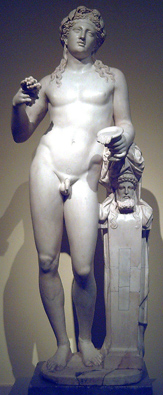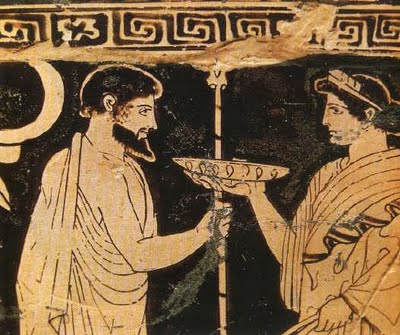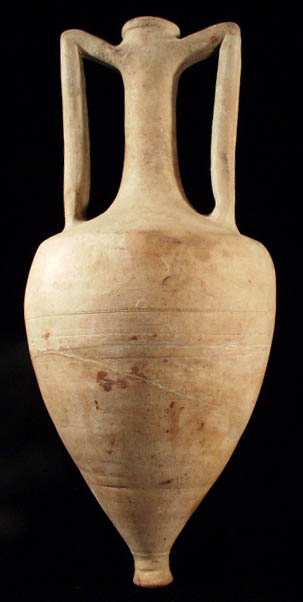| |


















 
|
Wine in Ancient Greece
Wine hit Greece and the islands of the Mediterranean around 6.300 years ago as it flowed out of the Middle East. And it was the Greeks who would later import wine to Egypt and much later to their Greek colonies in Italy, and therefore eventually the Romans.
Greek religion is dominated by the idea of the cycle of life, death, and re-birth ~ of the flowing of the seasons from the bountiful spring through to the desiccated winter. And viniculture easily permeated this ever present interest in the magick of nature. Grapevines bud in the spring, burst forth their fruit in the summer and fall, and lie dormant in the winter, waiting until spring will wake them up again, drawing them forth from the afterlife. The Greek god of wine, Dionysus, was a dying god ~ who like his beloved grapes was ritually killed each winter only to be reborn in the spring. |
| |
 |
A variety of wine rituals existed throughout ancient Greece, in its two precursor cultures the Minoan and the Mycenaean, as well as during the classical Greek period of the first millennium. Throughout the Minoan island empire, wine was a popular offering for their mysterious mother goddess Potnia ~ who required bloodless offerings unlike some of her divine counterparts and accepted wine as a suitable substitute in her rituals (she also, incidentally, accepted wool, cheese, honey, fennel, and coriander). Poseidon, a much older god than mainstream mythology gives him credit for, likewise favored wine as an offering ~ if statistical analyses of known offerings to him are correct. On the prehistoric mainland, where Mycenaean culture thrived, the Feast of New Wine (the me-tu-wo-ne-wo) was a popular ritual for the Mater Theia, an early mother goddess, rather than Dionysus, despite his already contemporary role as a dying god of wine. Feminist anthropologists suggest that this transfer of the normally male role was part and parcel of the fertility dynamic of the ‘new wine.’ Whether this ‘new wine’ was the first bud of the season in the vineyard or the first open bottle of the season (societal parallels would suggest the former) ~ posterity may never officially know, as the Pylos Text, our source for the Feast of New Wine is decidedly vague. |
| |
 |
 |
| |
In classical Athens, the year was filled with festivals devoted to wine, vineyards, and their chthonic patron god Dionysus. In April, around what the Greeks considered their new year, was the Anethesteria~ the Festival of the Vine Flower: three days of celebrations in honor of the opening of the wine jugs from the previous successful crop. It also featured a sacred marriage between the god Dionysus (in the form of one of his priests) and a high ranking wife of local society ~ similar to the sacred marriage between the dying god and the goddess in several other earlier and contemporary Mediterranean cultures. Wine was celebrated likewise at each stage of its production. For the ancient Greeks it was not just the final product that was of importance, but the sacred site of the vineyard and the process whereby wine was created from the earth. The Greater Dionysia in late spring celebrated wine’s and Dionysus’ powers of inspiration and creative merriment with sexy parades through the city of the god’s image, theatrical performances, and yep, you guessed it ~ lots of wine drinking. The Lenaea festival in winter celebrated the birth of one of the forms of the god Dionysus in conjunction with the successful completion of the fermentation of the previous season’s wine. It, like the Dionysia, featured theatrical performances albeit of a much more somber, tragic nature. The Lesser Dionysia, meandering over the summer, took the Greater Dionysia on the road: brining the festival and its performances to the outlying villages. And the Argionia, another country festival, was part revelry and part Mystery Cult: re-enacting a mythic nighttime hunt for the god through the forest by his slightly drunken revelers. |
source : sacredmistsblog.com
|
|